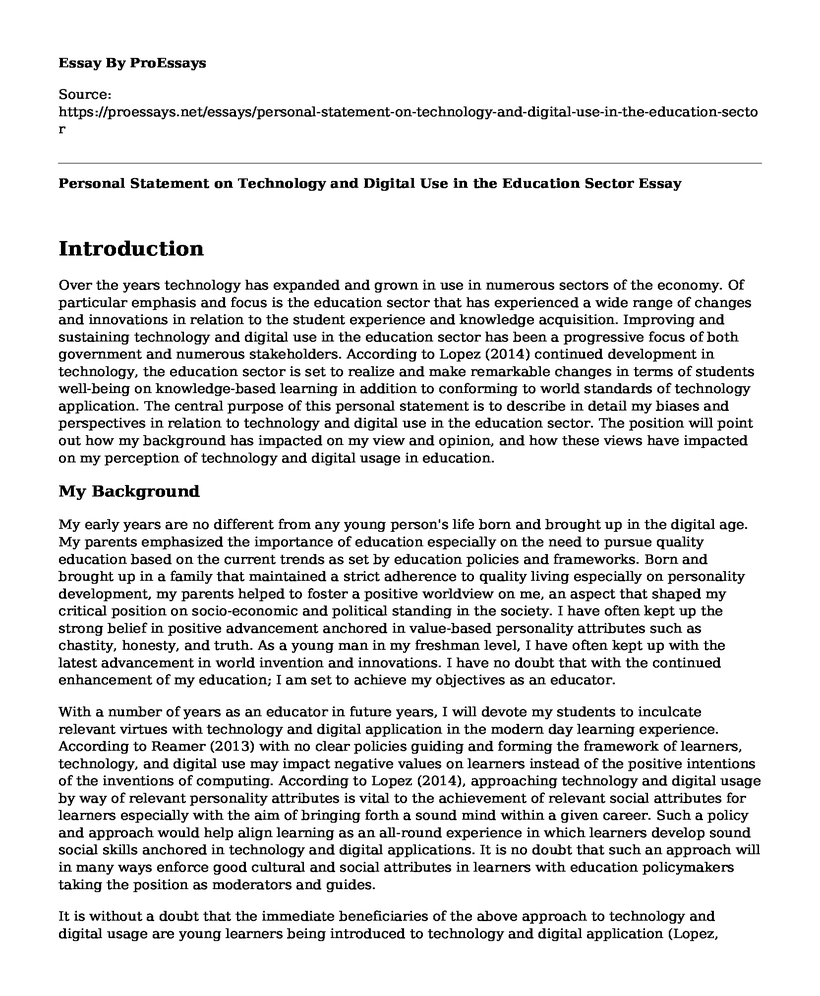Introduction
Over the years technology has expanded and grown in use in numerous sectors of the economy. Of particular emphasis and focus is the education sector that has experienced a wide range of changes and innovations in relation to the student experience and knowledge acquisition. Improving and sustaining technology and digital use in the education sector has been a progressive focus of both government and numerous stakeholders. According to Lopez (2014) continued development in technology, the education sector is set to realize and make remarkable changes in terms of students well-being on knowledge-based learning in addition to conforming to world standards of technology application. The central purpose of this personal statement is to describe in detail my biases and perspectives in relation to technology and digital use in the education sector. The position will point out how my background has impacted on my view and opinion, and how these views have impacted on my perception of technology and digital usage in education.
My Background
My early years are no different from any young person's life born and brought up in the digital age. My parents emphasized the importance of education especially on the need to pursue quality education based on the current trends as set by education policies and frameworks. Born and brought up in a family that maintained a strict adherence to quality living especially on personality development, my parents helped to foster a positive worldview on me, an aspect that shaped my critical position on socio-economic and political standing in the society. I have often kept up the strong belief in positive advancement anchored in value-based personality attributes such as chastity, honesty, and truth. As a young man in my freshman level, I have often kept up with the latest advancement in world invention and innovations. I have no doubt that with the continued enhancement of my education; I am set to achieve my objectives as an educator.
With a number of years as an educator in future years, I will devote my students to inculcate relevant virtues with technology and digital application in the modern day learning experience. According to Reamer (2013) with no clear policies guiding and forming the framework of learners, technology, and digital use may impact negative values on learners instead of the positive intentions of the inventions of computing. According to Lopez (2014), approaching technology and digital usage by way of relevant personality attributes is vital to the achievement of relevant social attributes for learners especially with the aim of bringing forth a sound mind within a given career. Such a policy and approach would help align learning as an all-round experience in which learners develop sound social skills anchored in technology and digital applications. It is no doubt that such an approach will in many ways enforce good cultural and social attributes in learners with education policymakers taking the position as moderators and guides.
It is without a doubt that the immediate beneficiaries of the above approach to technology and digital usage are young learners being introduced to technology and digital application (Lopez, 2014). In many ways, I do expect that parents and learners will respond positively to the adoption of technology and digital usage in their learning. For example, the use of Whatsapp groups, twitter handles, Facebook grouping to engage learners will go a long way in fostering positivity in good ethical living collaboration. However, one major worry that may come into play is the regulatory policies that may hinder an integrated approach to learning by the learners. On the other hand, one major setback for the scheme is the expansion of technology and digital learning in all learning institutions from the lowest level to the highest level of learning. At the same time, not all learners will have the ability to purchase the necessary computing gadgets for the same. However, most important is for governments to integrate value-based learning anchored on ethical standards such as honesty, truth and mannerism to foster and improve on student learning by use of technology and digital usage.
References
Lopez, A. (2014). Social work, technology, and ethical practices: A review and evaluation of the National Association of Social Workers' Technology Standards. Social work in health care, 53(9), 815-833.
Lopez argues that it is vital to incorporate ethical value based in learners to keep up with the rapid expansion of the digital age especially in terms of moral values and social etiquettes.
Reamer, F. G. (2013). Social work in a digital age: Ethical and risk management challenges. Social work, 58(2), 163-172.
According to Reamer, with the continued expansion and growth of digital technology, social has has faced numerous challenges conforming to ethical value based standards. As the global village continues to narrow, leaners need to adopt a virtuous approach to digital learning to keep up with the recommended ethical principles in later years in life.
Cite this page
Personal Statement on Technology and Digital Use in the Education Sector. (2022, Jul 08). Retrieved from https://proessays.net/essays/personal-statement-on-technology-and-digital-use-in-the-education-sector
If you are the original author of this essay and no longer wish to have it published on the ProEssays website, please click below to request its removal:
- Relationships of Feedback Loops and Information Systems Essay
- Security Protection Plan for Executives Essay Example
- Paper Example on Rams Project: Improving Students' Academic Performance and Teacher Preparedness
- Essay Sample on Pattie Maes Unveils Sixth Sense Technology at TED: Simplifying Life Activities
- Essay Sample on Deep Learning: A Crucial Component of Artificial Intelligence
- Essay Sample on Digital Revolution: Impact on Society's Infrastructure and Crime Rates
- Paper Example on Balancing Act: The Pros and Cons of Students' Internet Use







